
Andrew Ahn, who directed the sensitive. moving dramas "Spa Night" and "Driveways," shows his talent for comedy with Hulu's "Fire Island." The film, written by and starring Joel Kim Booster, is a contemporary take on Jane Austen's "Pride and Prejudice," with an almost-all gay male cast. (Margaret Cho, playing a lesbian den mother, is the sole woman).
In the film, Noah (Booster) helps his best friend Howie (Bowen Yang) connect romantically with Charlie (James Scully), a hot doctor who seems attracted to him. However, as Noah meddles in Howie's affairs, obstacles arise for the potential couple. What is more, Noah is both attracted to and repelled by Charlie's friend, Will (Conrad Ricamora, exceptional in the Darcy role).
The plot is an excuse for all the characters to attend parties, drink and do drugs, have sex (or not), and consider the meaning of love and friendship. Ahn allows the large ensemble of out gay actors (which includes Matt Rogers, Tomás Natis, Torian Miller, and Zane Phillips) to lean into the material with wit that is both droll and campy. But "Fire Island" also addresses themes of race and class in addition to sexuality.
RELATED: The best new movies to watch from home, from "Everything Everywhere All at Once" to "Fire Island"
Ahn chatted with Salon about "Fire Island."
This film is a comedy, which is certainly a change of pace from your previous features which were more serious in tone. Can you talk about how you approached the material?
"It was letting our cast take the lead. They were so good at being funny and improvising with each other, I wanted to let them find the tone themselves."
I think on a macro level, my goal is the same as a director whether I am directing a drama or a comedy. I am searching for emotional truth. Audiences have to believe the moment unfolding in front of them. That's always my first priority. There are many different elements that are involved in finding that emotional truth. A big part of it is performance, another part is tone, and that's where there are the micro-level differences between a drama and a comedy. With a comedy, you have to surprise audiences constantly. That's a how a laugh works — it's a surprise. That can get distracting. That is what often leads to bad comedies; they reach for the joke rather than have it come organically from the story or the characters.
Want a daily wrap-up of all the news and commentary Salon has to offer? Subscribe to our morning newsletter, Crash Course.
I did a lot of prep work in the conceptualization of the film, trying to understand the tone of the movie. I had a lot of conversations with Joel and did a lot of dramaturgical work, looking for places in the screenplay to emphasize humor, de-emphasize humor, overplay or underplay a joke, and then it was letting our cast take the lead. They were so good at being funny and improvising with each other, I wanted to let them find the tone themselves. I was creating an environment where they could experiment and have fun. I tried to have a light touch. If I overmanipulated this, I would be forcing a tone instead of finding a tone. I think comedy is very precise. The difference between a joke working and a joke not working could be a single word, it could be a gesture, or it could be a couple frames in the edit. It was a real learning experience for me. It was very craftsman-ly. I had to work with my team to finesse every joke in the movie to maximize that feeling of surprise and ensuring it would get a laugh. I hate watching a comedy I made. If people don't laugh, it's a terrible feeling. There's less pressure watching a drama like "Spa Night" or "Driveways."
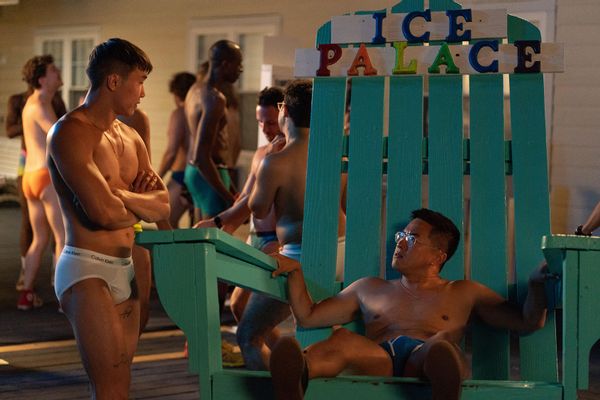
"Fire Island" is one of the few gay male Asian rom-coms I've seen — "Front Cover" being another. What can you say about representing the gay, Asian community? Is there pressure or opportunity to do this?
There's definitely pressure, but it has less to do with the film and more to do with the fact that this is a film that has this kind of opportunity. It has marketing money behind it and a platform like Hulu. I have seen gay Asian rom-coms before. "Front Cover," Alice Wu's "Saving Face," and very significantly for me, Ang Lee's "The Wedding Banquet." There have been many movies; they just have not necessarily gotten the exposure that we are getting with "Fire Island."
Making the film, I had to focus on the film itself. I benefitted from being an indie filmmaker; I have no expectations of my work being seen. [Laughs] I just enjoy making the work, so that was my main goal. But now in the distribution of it, I understand and feel the pressure of it. My hope is that I can take this opportunity to help other queer and Asian American filmmakers make their own work and that "Fire Island" will help them in their pitch meetings so there are more and more of these, and we can shoulder that pressure together as opposed to place it all on one movie at a time. It is only in creating a canon of films that we were able to relieve ourselves of that burden of representation.
I appreciate that you emphasized the shirtless hotness of Joel Kim Booster and Conrad Ricamora. Can you discuss how you filmed these guys to make them "hot and powerful" (as one character says) and how their costumes changed throughout the film to reflect their identity shifts and their appeal? The tiger shirt, Noah wears, for example.
"My cinematographer Felipe Vara de Rey and I wanted to show these characters as beautiful beings. We were very inspired by the Tom Bianchi Polaroids."
There is definitely an arc to both characters that we wanted to underscore with the costuming, and David Tabbert is a really emotional costume designer. He thinks about the characters; it is not just aesthetics. I really appreciated that. We wanted to soften Will as the film goes on. We wanted to see Noah's walls come down, and that is subtly but clearly emphasized.
I really wanted to show how beautiful this cast is. We looked at a lot of photography. My cinematographer Felipe Vara de Rey and I wanted to show these characters as beautiful beings. We were very inspired by the Tom Bianchi Polaroids. Even the aspect ratio, which was different than standard — we shot 1:76 — was a choice so we could see more bodies and gesture, and shape, and form. More widescreen you go, the more it becomes about the face. We made choices to really see them. That was important for me, that you understood these people as a holistic whole, and not just pieces. I love the tiger shirt. I am Year of the Tiger. It was Joel's pick.
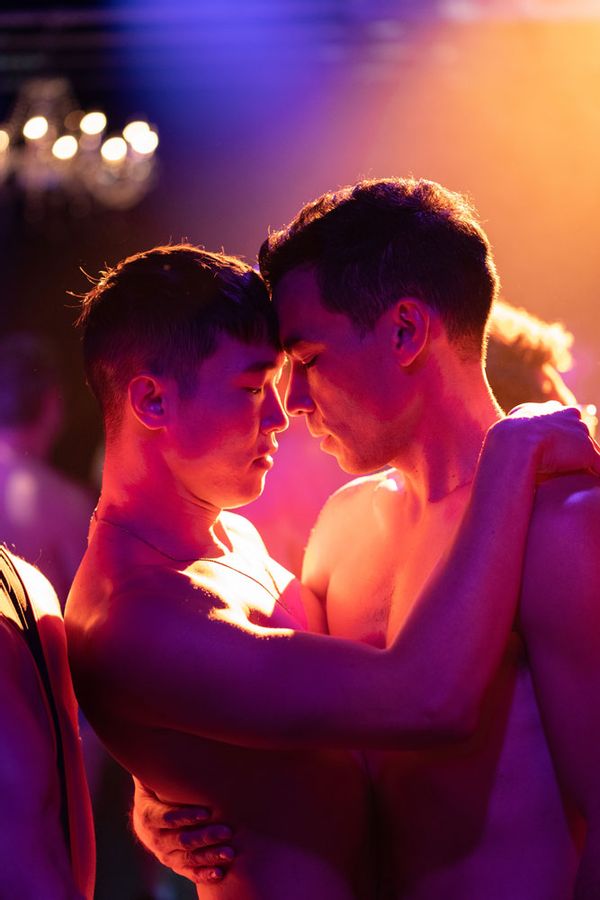
A scene of Noah and Will dancing at an underwear party is sexy, and there is also the scene of them in the rain. Can you talk about developing their sexual tension?
I think with both of those scenes, again I was really interested in capturing bodies and the proximity and the shape and contour and so we had two visual strategies. One was to go wide and see the distance between them, whether it was big or small. The other strategy was to go very, very tight. And it is that tension between those two visual strategies that adds to the tension of the characters' desires.
I remember with the dance scene a lot of what makes something sexy is what you don't see, so the light coming in and out was really effective in doing that. Actually, when the light hits very hard, it blows out the image. You end up not seeing something in the highlight. I found that really exciting, cinematically. Similarly, with the rain scene, the darkness hides a lot and I think that that is really sexy. You don't see them super brightly lit and clear. What you don't see adds to the sexiness of the moment.
Like in the backroom sequence. Speaking of which, there is a sex video as a plot point, and Noah does walk in on an orgy, but the film is more romantic than erotic, which is appropriate. Was there a deliberate decision to steer away from sex for the sake of the story? How did you approach the sexual scenes in the film?
I wanted to show sex in the film in that sex happens on Fire Island. I didn't want to avoid it. At the same time, very strangely, these characters are not having a lot of sex, namely because of this plot device of Noah having to get Howie laid before he gets laid. So, the film is more about the search for sex, or sexual connection, than the actual act itself. I was taking my cues from the story. I think it's important we [showed] sex in the film, and I think we had a good philosophy about it, which was that we weren't going to sensationalize it. It was a natural part of this environment and gay culture.
"I think queer people are often very good at performing. We have had to learn that skill as a survival technique."
The sex tape was the most difficult aspect of the story because it's a trauma, and Joel and I talked a lot about how we wanted to treat that. I had a discussion with Matt Rogers, we had an intimacy coordinator. We talked about its connection to "Pride and Prejudice." We found a way to portray it and address it in a way that felt appropriate for this film. It was definitely what Joel and I talked about the most.
What about the ideas running through the film that most gay men are horny idiots, that the monogamy industrial complex is not for them, or the incredible self-loathing these men have because they do not feel good enough? Are you worried about perpetuating stereotypes and myths?
I am not really worried about that. I think the film does a good job of showing two different perspectives on love and sex and really validating both. There is definitely some commentary on the two, but I think the film doesn't judge Howie or Noah for how they want to pursue relationships. It shows that gay culture is not a monolith and there are probably many other different perspectives on love and sex. That criticism has less to do with our film and more to do with the society that we live in which is often very judgmental. We are trying to show that there are different perspectives on this.
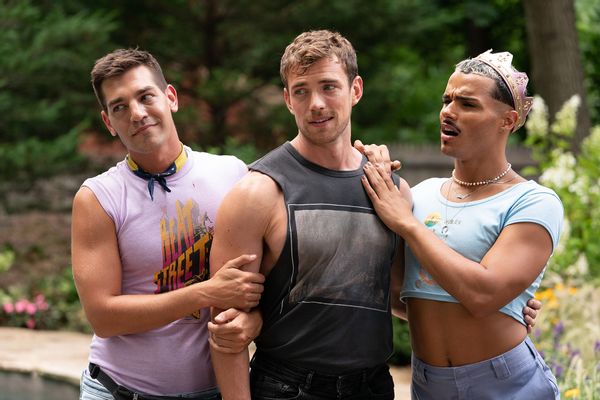
Will tells Noah that Dex (Zane Phillips) "hides who he really is." Will is politely warning Noah about this guy, but Noah is not picking up the clues. What are your thoughts about how gay men project a false front and can even abuse each other, which was also a theme in your film "Spa Night"?
I think queer people are often very good at performing. We have had to learn that skill as a survival technique. So, once we learn how to control it, we can use it against each other sometimes. That's the beauty of Joel's screenplay. You could interpret it as encouraging queer people to let go of the performance to live a more honest life, and to live it with people who love you for who you are without the performance to gain their love.
"You can't perform a different race. As gay Asian Americans, this is something that we can't escape, and I think that's where we feel we don't have control."
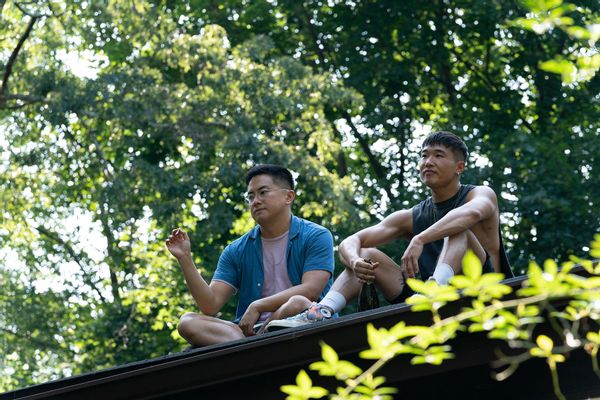
There is something about performance, again; once we understand how to use it, it's an opportunity for us to use it to our advantage and part of that is sexual exploit and desire and wanting to be desired. I think the film is making an observation that there are certain things we can't perform our way out of, and one of those things is race. You can't perform a different race. As gay Asian Americans, this is something that we can't escape, and I think that's where we feel we don't have control. To a certain extent, these characters feel the helplessness of it. It was always important for me and Joel to find the power in it. I think that that comes with the friendship between Howie and Noah. When Noah says to Howie, "We're the hottest ones here." In a friendship, how can you find energy and power instead of letting society take it away from you?
I really liked the scene where Howie and Noah have a heart-to-heart and Howie talks about wanting to feel vulnerable even if it hurts. It's really moving. We rarely get to see men, even gay men, talk honestly about their feelings on screen. Can you talk about that scene and working with Joel and Bowen on creating their friendship?
I love that scene. It is really powerful to see two people who have such an intense connection have very different life philosophies. I really love that some people might think of it as Howie's lowest moment in the film, but in many ways it's a declaration of his individuality. There's strength in what he is saying. It's not a pity party. A lot of people don't understand that there is strength in being vulnerable. Noah doesn't understand that. That was a note I gave Bowen on set. I loved how Bowen found a dignity to that character and that moment. Another actor would have fallen into wallowing.
I love Joel's performance in that scene as well. He is holding space for Howie in a really beautiful way. There's a witnessing. There is something very selfless about his performance there that is rooted in the fact that he is real-life friends with Bowen, and he really does want the best for his friend. There's a lived-in quality in that conversation. It stems from the fact that there are two people who dropped acid and held each other on the beach watching the sunrise. True story.
There are party scenes, karaoke scenes, and even a dance off with a drag queen emcee. Can you talk about staging these sequences and how you created the film's queer vibe?
I was very inspired by my cast and encouraged them to bring themselves into it. That karaoke scene of Britney Spears' "Sometimes," that was Bowen's suggestion. In the script it was written in as "Will You Still Love Me Tomorrow." Bowen brought a queerness to it by choosing Britney Spears. Luke (Matt Rogers) and Keegan (Tomás Matos), their choreography was all Matt and Tomás. I didn't suggest it. In their movement, because they are queer people, there's a queerness to it. Being open as a director and encouraging self-expression just suffused this entire film with a queer sensibility. I was happy we had an all-queer cast for this. It allows this process to work. I didn't have to control so much of it myself to bring a queer sensibility. I knew it would organically happen.
" Conrad is a really good dancer — he's a great dancer ... All that choreography was Conrad Ricamora being the cheeseball that he is.
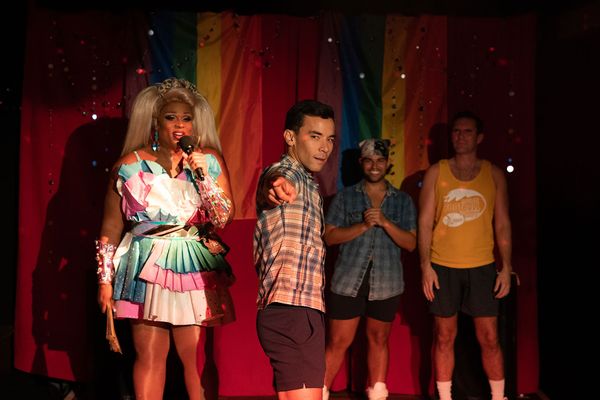
I need to know about Conrad's dance scene. How did that come to be? Was he prompted to do that or is he that creative?
We had never rehearsed that scene before that day. The cast and I had gone out dancing the first weekend of the shoot. Conrad is a really good dancer — he's a great dancer. That's kind of the humor of it. Will is not a bad dancer. He's awkward and maybe a little too studied. I love that about Conrad's performance. I remember telling Conrad that Will has seen a lot of dancing, knows what dancing should look like, and I gave different prompts. I'd say "breakdancing," or "think early 2000s boy band." All that choreography was Conrad Ricamora being the cheeseball that he is, and loving to dance, but having to do it badly in this case. He is such a cheeseball. It's really endearing.
All of your films are about families, albeit different kinds of families. What can you say about your penchant for telling these kinds of stories?
I think there is such of depth of emotion when we talk about family. Everybody has an opinion and a relationship to family, whether you are queer or straight. It's so universal. There is something about family that stresses me out because there are expectations and responsibilities. Drama naturally springs from the concept for family very easily. I am drawn to it because it's just such an intense subject matter. I want to emphasize it. With "Fire Island" I saw what Joel was getting at, and I wanted to push this family aspect even further. A different director would emphasize the romance. But I feel very strongly that it's really what brings us together is this concept of family.
More stories to check out:


.png?w=600)




